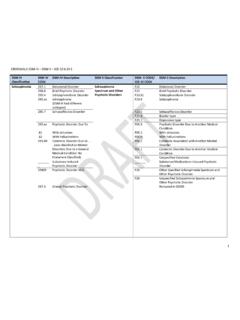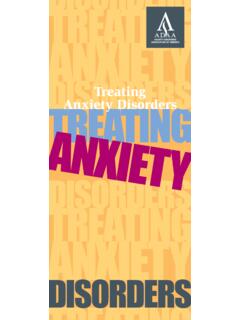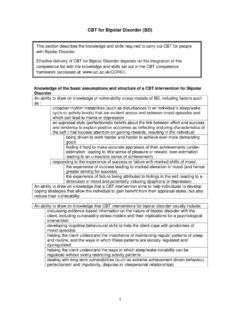Transcription of SAMPLE NURSING CARE PLAN: Bipolar I Disorder, Manic ...
1 SAMPLE NURSING CARE PLAN: Bipolar I Disorder, Manic Episode NURSING Diagnosis 1: Risk for injury related to mania and delusional thinking, as evidenced by believing one is receiving messages from God, intrusive behavior in public, and high energy level. NURSING Diagnosis 2: Disturbed sleep pattern related to the symptoms of mania, as evidenced by sleeping only a few hours in a week without feeling tired. NURSING Diagnosis 3: Risk for situational low self-esteem related to change in expected job progression, as evidenced by denial of tenure in academic position and potential loss of significant other Expected Outcomes NURSING Interventions Evaluations Short term: Will contract not to harm self or others during hospital stay.
2 Will follow unit rules. Will experience a decrease in or cessation of psychotic ideation. Will not engage in substance abuse/misuse. Will sleep at least 6 hours per night. Will achieve adequate food and fluid bathe and groom daily. Will participate in unit activity schedule. Will make appointment for follow-up care with psychiatric and counseling center before discharge. Develop caring rapport with client. Regularly assess client for safety. Review unit rules with client and give him any necessary reminders to help him display acceptable behavior. Observe client for changes in psychotic ideation. Assess client for substance abuse/misuse.
3 Monitor sleep and promote positive sleep hygiene. Monitor food and fluid intake for adequacy. Discuss plans for future career the importance of ongoing follow-up care in the prevention of relapse. Client remains free of injury during inpatient hospital stay. Client follows the unit s rules with minimal difficulty. He displays a calming energy level and his thoughts gradually return to a reality base within 72 hours. Interacts coherently with staff and peers. Client has no signs of substance abuse, with a normal blood alcohol level and drug screen. Client is sleeping for at least 6 continuous hours during the night.
4 Client has appropriate food and fluid intake and is appropriately engaging in self-care and is groomed. Client is beginning to talk about his job situation and is expressing appropriate feelings of sadness and anger related to his loss and alteration in status. Client is demonstrating appropriate behavior with staff and peers on the unit and is beginning to discuss his need for follow-up care for his Bipolar disorder and excessive substance appointment for two days after planned discharge date. Psychopharmacologic: Will adhere to medication schedule. Will attend medication group and will review his prescribed medications with his primary nurse.
5 Long-term: Will actively engage in classes to learn about Bipolar disorder. Will continue in follow-up care after hospitalization. Administer prescribed medications such as lithium carbonate, 600 mg three times per day, and quetiapine (Seroquel) (100 mg daily on day one (with daily increase of quetiapine until therapeutic level is reached, usually 500 600 mg). Monitor medication administration closely for adherence. Teach client about his disorder and medications and review information to promote postdischarge plans with client, family, and significant others. Discuss the need to commit to follow-up care and to keep scheduled appointments with client, family, and significant Client demonstrates adherence with medication schedule and regularly attends medication group.)
6 Client shares information about the disorder with family and significant others. Client schedules initial, postdischarge appointment with the psychiatric counseling center. During group therapy shares with other clients an interest in attending a DBSA support with therapist entries that he has made in his journal. Will attend a DBSA support group soon after discharge. Will keep a daily mood journal and also a list of essential topics to discuss in follow-up care with therapist. others. Give the client printed information and a phone contact for the local Depression and Bipolar Support Alliance (DBSA.)
7 ; the National 24-hour Suicide Prevention Hotline: 1-(800)-273-TALK or 1 (800)-273-8255 and NAMI s Family to Family classes that help to educate loved ones about mental health issues, how to help their loved one, and how to help themselves Demonstrate to client how to keep a journal and explain its use in postdischarge plan of care.






